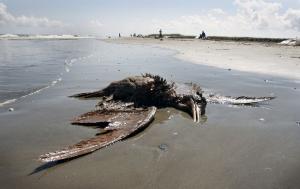July 10 (UPI) — New research suggests the ecological impact of an oil spill is comprehensive, yet environmental assessments are often too narrow in scope.
Too often, researchers argue, oil spill assessments focus exclusively on the species most obviously affected. But the latest study shows oil spills have unexpected — and indirect — impacts on species farther down the food chain.
In reassessing studies of food webs in the Gulf of Mexico in the wake of the 2010 Deepwater Horizon oil spill, researchers showed the loss of seabirds and marine mammals was linked with increases in forage fish populations.
The loss of predators, the new analysis showed, yielded increases in the abundance of menhaden, a group of forage fish species.
“Our discovery suggests that the structure of food webs change after an oil spill, which may be much more damaging to fish and other aquatic fauna than the direct impacts of the spilled oil itself,” researcher Jefferey Short said in a news release.
Short and his research partners published their findings this week in the journal Archives of Environmental Contamination and Toxicology.
“While the direct effects of oil spills on ecosystems have been well documented, this new study following the Deepwater Horizon blowout in 2011 provides the first indication that oil spills can alter the nature of entire aquatic food webs,” said Peter S. Ross, editor-in-chief of AECT.

COMMENTS
Please let us know if you're having issues with commenting.